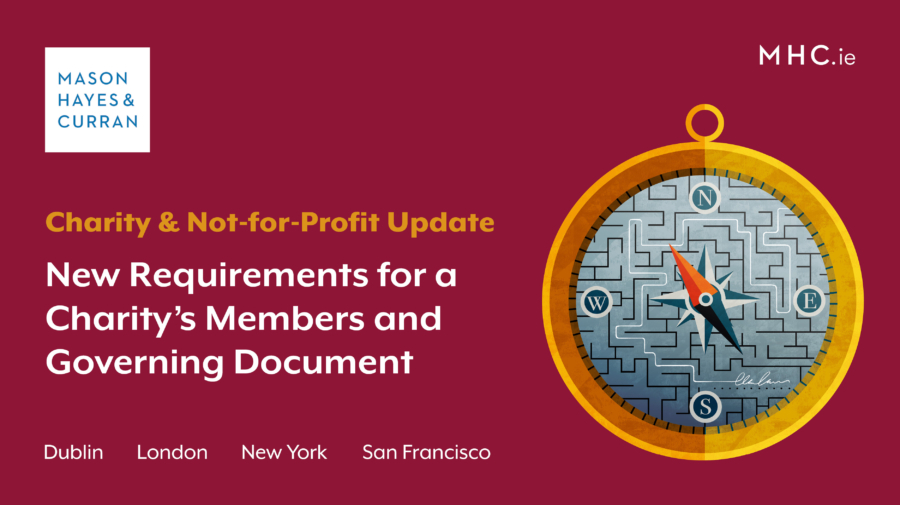New Requirements for a Charity’s Members and Governing Document

While the commencement of the Charities (Amendment) Act 2024 is awaited, it is advisable to take the opportunity to plan for the changes which the Act will introduce. Our Charity & Not-for-Profit team considers the new requirements regarding a register of members, and publication of the governing document of a charity.
Many charities will be aware that the Charities (Amendment) Act 2024 (the Act) was enacted in July 2024. While enacted, the Act has not yet been commenced and therefore is not yet in force. We have written recently about the key features of the Act. However, there are two provisions that will be of particular interest to religious charities. Although they are not yet in force, it is worth taking the time now to consider the provisions and their practical impact on religious charities. Taking steps to address them in advance will help ensure readiness before the provisions come into force.
Members of a charity
The Act has, for the first time in the context of charity law, introduced a definition of a “member” of a charity. For those charities that are companies, the concept of “membership” will already be a familiar concept. The Companies Act 2014 clearly defines the “members” of a company, and imposes an obligation to maintain a register of members. The Act acknowledges this existing company law definition and confirms that for those charities that are companies, the company law members are also considered to be members within a charity law context.
For those charities that are not companies – i.e. other types of corporate bodies, or unincorporated bodies, the Act provides a specific definition of members. Members are defined as those who are:
“entitled to appoint, nominate or vote for the appointment of a person as a charity trustee of that organisation”.
Religious orders or congregations without a company structure who rely on local canonical structures for their registration with the Charities Regulator may face challenges, as the Act introduces new obligations relevant to members.
Previously, local ordinary members of an order or congregation were often seen as the “members” under charity law. However, the Act now provides a clearer definition. It states that “members” are those who have the authority to appoint, nominate, or vote for the charity trustees. This may therefore include all professed members where they have such authority.
Religious charities in particular should take the opportunity to carefully consider this point, and identify each individual who will be captured by this new definition.
Amongst other things, the Act introduces a new requirement to maintain a “Register of Members”. This must include:
- The name and address of each member
- The date on which their details are entered on the register, and
- The date on which they cease to be a member
The Act requires that where someone ceases to be a member, their information must be removed from the register within one year.
Publication of a charity’s constitution
The Act has updated the provisions of section 39 and section 40 which relate to the registration of charities. As part of these updates, the Charities Regulator is now required to include a copy of the charity’s constitution, i.e., its governing document, on the Register of Charities. This will particularly affect those charities that are unincorporated associations or trusts, as their governing documents are not presently publicly available. Charities that are companies already have their constitutions publicly available on both the Companies Registration Office and the Register of Charities. This change relates to the provisions about new registrations. However, it is unclear whether the Charities Regulator will also take steps to publish the constitutions of already-registered charities. This would apply to cases where the constitutions are not currently available on the register.
Comment
These are just two of the changes which are included in the Act and are part of a series of wider changes. We recommend that charities consider and plan for these changes now before the Act is commenced. Charities can do this by considering the current structures around the appointment of members, and also considering whether they are happy for their governing documents to be published in their current format.
For more information and expert advice, please contact a member of our Charity Law and Not-for-Profit team.
People also asked
What is a charity in Irish law? |
A charity is an organisation that meets the definition of “charitable organisation” in the Charities Act 2009. This will be amended by the Charities (Amendment) Act 2024 when commenced. It is a requirement for all organisations that meet this definition to apply for registration as a charity. |
What are the rules for a charity? |
The Charities Act 2009, as amended by the Charities (Amendment) Act 2024 – which is yet to be commenced - sets out the main legal obligations specific to charities under Irish law. Charities are also subject to other legal obligations depending on the nature of their work, such as employment law, GDPR, health and safety etc. |
The content of this article is provided for information purposes only and does not constitute legal or other advice.
Share this:




